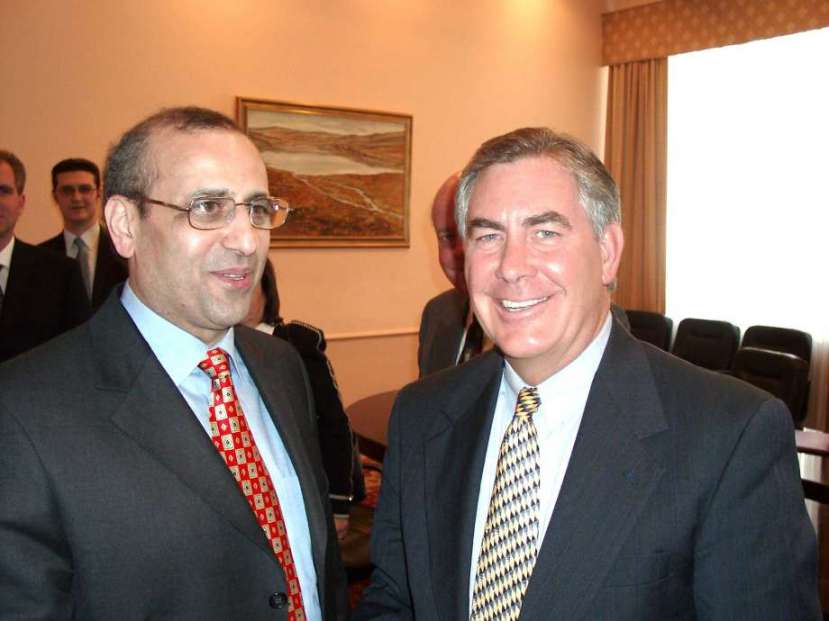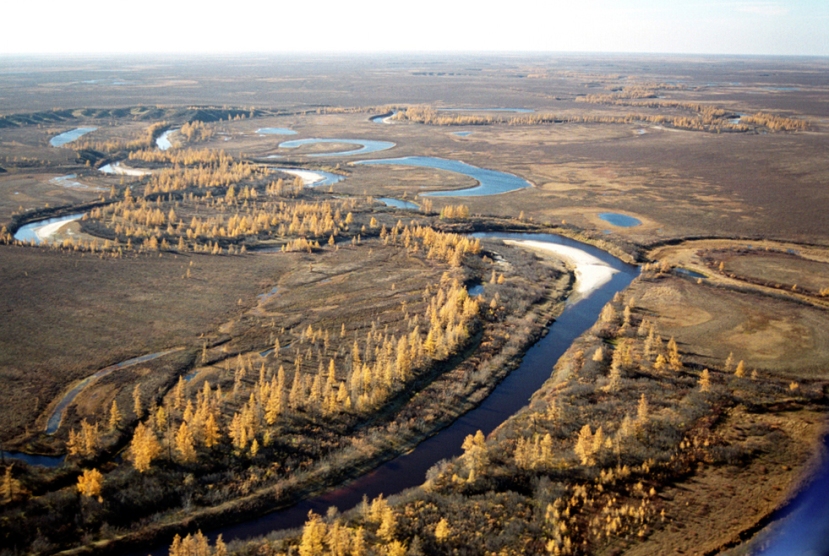
US Secretary of State Rex Tillerson meeting with Igor Yusufov in 2002. Photo credit: Aleksei Turbin.
By Anders Lorenzen
Former Exxon CEO, Rex Tillerson, has now been approved as the next US Secretary of State. A lot of speculation has surfaced as to what this might mean for energy production, and not only in the US but also in Russia where he is said to have close ties. Some are even speculating that with the appointment of Mr Tillerson the US will lift sanctions imposed on Russia, which in return could benefit the Secretary of State’s former company. To find that out, A greener life, a greener world spoke to Russian energy expert, Igor Yusufov.
The appointment of Tillerson will not impact energy production in Russia
Mr Yusufov was not convinced that the appointment of Rex Tillerson would necessarily have an impact on oil or energy production in Russia. But he nevertheless stated that Mr Tillerson’s diplomatic skills would be good for both energy production and collaboration between the two countries. Mr Yusufov served as Russian energy minister in 2002, on which occasion he met Mr Tillerson. He was in no doubt about the assets that Tillerson would bring to the table. He said that Tillerson had been “ head of a company which during his leadership became very successful and rich and provided him with useful diplomatic skills. Let me remind you of the joking expression he used in his first speech in the Department of State when he referred to 41 years in ExxonMobil as a very good training course.”
Contrary to news reports by western media sources, the former Russian energy minister does not think that drilling for oil in the Arctic was held back by sanctions. He nevertheless stated that a lifting of sanctions could only be good for Russian energy production: “the lifting of sanctions could be beneficial to both American and Russian energy corporations. Russia has many prospective projects including those in offshore regions. We need investment, technologies and effective management”, he stated.
Mr Yusufov continued: “sanctions represent serious barriers to the implementation of significant international projects. Though US-Russian energy cooperation which started 15 years ago continues, our countries really need each other in this crucially important business field. In a series of interviews this year in an effort to enforce this move on renewing energy ties I proposed to convoke the Third Russian-American Commercial Energy summit. The first and second such meetings were organised in 2002 and 2003 in Houston and Saint-Petersburg with the participation of both government agencies and private business.”

The Yamal Peninsula could be a heaven for oil and gas companies. Photo credit: Gazprom.com.
The bright future of oil and gas in Russia
Mr Yusufov drew on his experience of having funded Fund Energy, which he described as a kind of Russian energy think-tank, with the goal of it becoming a medium-sized vertically integrated oil and gas company pointing to a bright future for the oil and gas industry in Russia. He said “since it was started in 2011 from point zero, Fund Energy is now (end of February) estimated to be worth $3 bn, and conducts exploration and production of oil and gas on a dozen projects in Siberia and the Yamal peninsula. It possesses licenses for exploration and production of hydrocarbons on more than a dozen license blocks in the northeastern districts of Russia, accounting for at least 230 million tonnes of oil and 500 billion cubic meters of gas. Since 2015, it has produced more than 3.5 million tonnes of oil in on the Yargeo project in the Siberian Yarudeyskoye oil field. It is estimated that the Khotogo-Murbaysky field in northern Yakutia possesses 10 billion cubic meters of gas and at least 58 million cubic meters of helium.
Arctic oil is as alive as ever
But, in what will undoubtedly worry environmentalists, Mr Yusufov stated that he was as confident as ever about Arctic oil drilling, and he thinks that the new collaboration between Russia and the US makes that a real possibility: “I am confident that the joint ExxonMobil–Rosneft project in the Kara Sea has an excellent future. ExxonMobil invested $640 million including the financing of the exploration drilling. The drill core is now in the process of analysis in the Exxon laboratories in Houston. My hope is that shortly we will get encouraging news of the discovery of a new important deposit. This means that even under present conditions, leading American and Russian companies will continue to successfully search for secure ways to extract oil in harsh Arctic off-shore conditions. I see it as the first step to the future co-operation of giants such as Exxon and Rosneft in conducting hydrocarbon production in Arctic regions.”
Russia’s shale ambitions
Again, contrary to what western media sources are reporting, Russia could potentially be about to enter into shale gas exploration, popular known among environmentalists as fracking. This is of course at odds with reports stating that Russia has in fact been financially supporting anti-fracking groups in order to kill the technology. But on shale production, Mr Yusufov stated: “the majority of Fund Energy projects, for example in Yamal deal with heavy-to-extract oil and gas! At the same time, other Russian companies are already developing deposits with stranded oil and gas. According to official data, Russian subsoil has approximately 20-40 billion tonnes of this kind of oil, and our companies are capable of dealing with this product.” But Russia is still only in the exploration stage and in the process of obtaining necessary scientific and practical knowledge, Mr Yusufov said.
Renewables in Russia to remain in its infancy
Despite enormous potential for renewables in Russia, they have hardly made a dent. And it is perhaps symptomatic of the attitude towards renewables in Russia that when I asked Mr Yusufov about it, he focused more on coal: “It is a point of universal understanding that oil and gas deposits will be exhausted one fine day. As in many other countries, we think about other energy sources – the use of coal seems in this regard important due to the famous Russian climate. When we analyse the First Steps of the Energy Policy published recently on the White House internet site we see the development of coal technologies as one of the priorities. Some 16 years ago the US invested considerably into searches for new “cleaner” coal technologies. Active research work conducted in Russia on the implementation of renewables, and best practices in this area, do not account now for more than 2-3% or the total energy production. Those energy sources are still rather expensive, so I see the future of the Russian and global energy mix in a reasonable combination of both traditional and renewable resources.” Mr Yusufov did hint that Russia does intend to develop renewables and that Russia has programmes in place to do so. But at the moment a clever market-oriented balance between fossils and renewables is on the agenda
Anyone keen to see solutions to tackling climate change would be worried about Mr Yusufov’s statements, at least on renewables, and also in his desire to continue to explore for fossil fuels, and especially his statements on coal. Taken in conjunction with the latest rhetoric from the Trump administration on reviving the coal industry, it would appear that two of the world’s largest fossil fuel economies seem at odds with the world’s resolve to tackle climate change: The Paris Agreement, the economic trends, and the narrative agreed upon by a majority in the financial sector had seemed to indicate that coal is dead.
Categories: energy, Geopolitics, interview
6 replies »